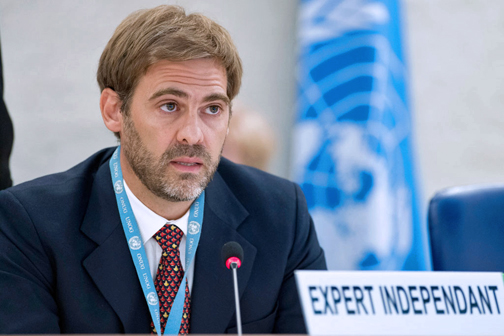UN: ‘Human rights cannot be sidelined” in PR crisis

The United Nations Independent Expert on foreign debt and human rights has called for fair solutions to the huge debt crisis in Puerto Rico, warning that ratcheting up austerity measures will threaten residents’ human rights and worsen the U.S. territory’s “intolerable” poverty levels.
Juan Pablo Bohoslavsky, who on May 19 requested from the United States an invitation to carry out a fact-finding visit to Puerto Rico, on Monday called for “meaningful relief to reduce the debt to financially and socially sustainable levels.”
“Ensuring financial stability, controlling public debt and reducing budget deficits are important goals, but should not be achieved at the expense of human rights,” said the expert as he published a detailed statement on the crisis.
“The population cannot be held hostage to past irresponsible borrowing and lending,” he said. “The economy should serve the people, not vice versa. Losses need to be fairly distributed. Bondholders, including hedge fund investors, need to take their fair share.”
The Financial Oversight and Management Board dealing with the crisis must ensure that economic, social and cultural rights are not undermined by giving absolute priority to creditors’ rights and by imposing excessive austerity, Bohoslavsky said.
He welcomed recommendations from a U.S. congressional task force for fairer federal funding of health insurance schemes and more tax credits for families.
“Reducing the tax burden of families with children is one of the many measures required to combat intolerable levels of poverty in Puerto Rico,” he said, highlighting that nearly 60 percent of the island’s children live in poverty.
“Puerto Rico’s fiscal plan needs to prevent further harm to persons in situation of vulnerability. Reform measures must guarantee protection for the rights to health, food, housing, and social security,” he added.
“The island simply cannot afford further austerity,” Bohoslavsky underscored. “After 10 years of economic depression, further spending cuts will not assist economic recovery, but will accelerate emigration and undermine the provision of essential public services.”
In his assessment, Bohoslavsky noted the particular impact of the debt crisis on persons with disabilities — pointing out that residents in Puerto Rico receive an average of $74 per month in federal support for living expenses compared with the mainland average of $540.
“Actual costs of living do not justify such differences in public support,” he said. “Under international law, the U.S. remains responsible for ensuring that the social rights of all individuals living under its jurisdiction are fully protected without any discrimination.”
Leilani Farha, special rapporteur on adequate housing as a component of the right to an adequate standard of living, and to the right to non-discrimination in this context; Catalina Devandas-Aguilar, special rapporteur on the rights of persons with disabilities; Dainius Pūras, special rapporteur on the right of everyone to the enjoyment of the highest attainable standard of physical and mental health; and, Hilal Elver, special rapporteur on the right to food backed Bohoslavsky’s observations.













